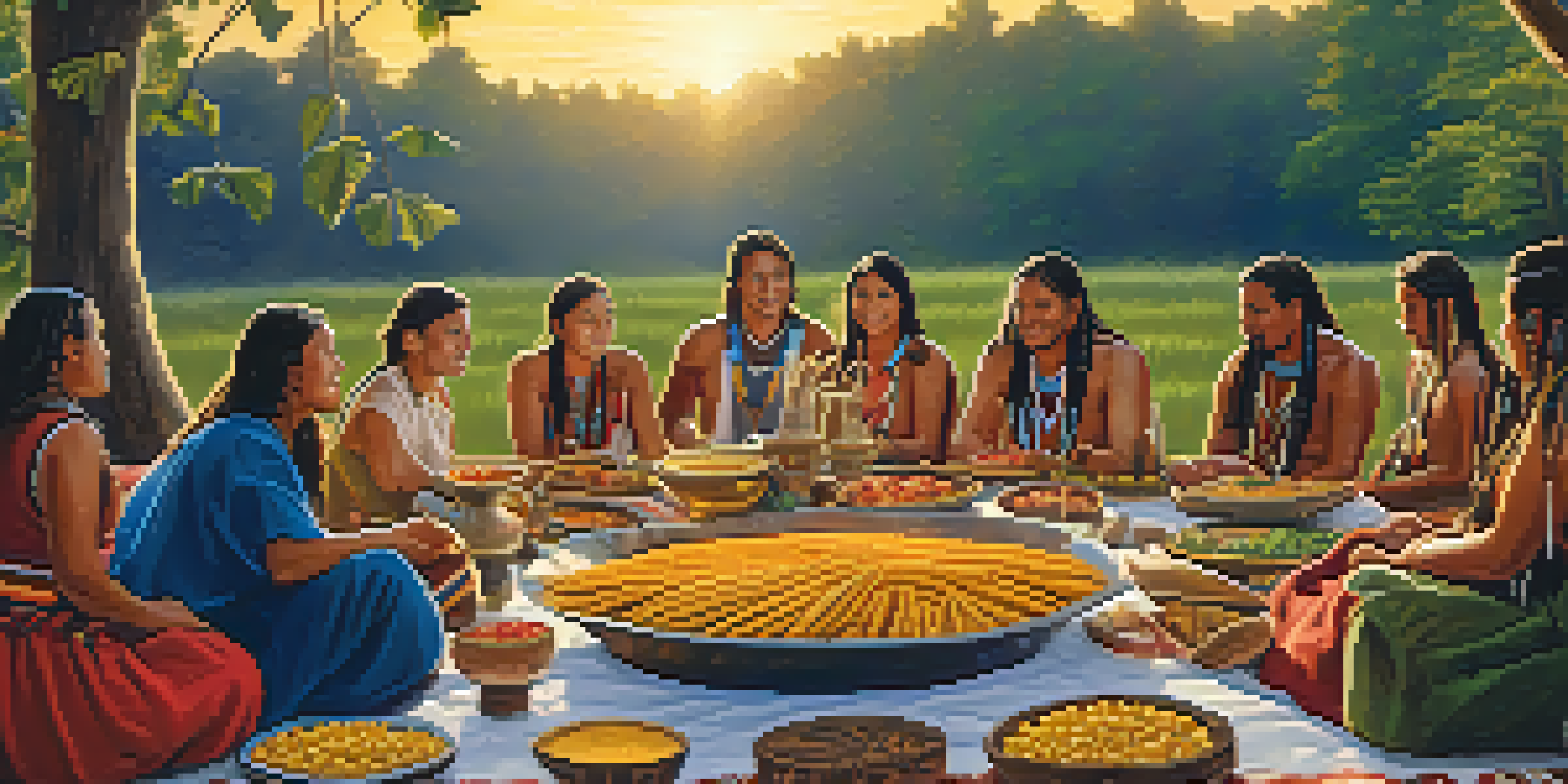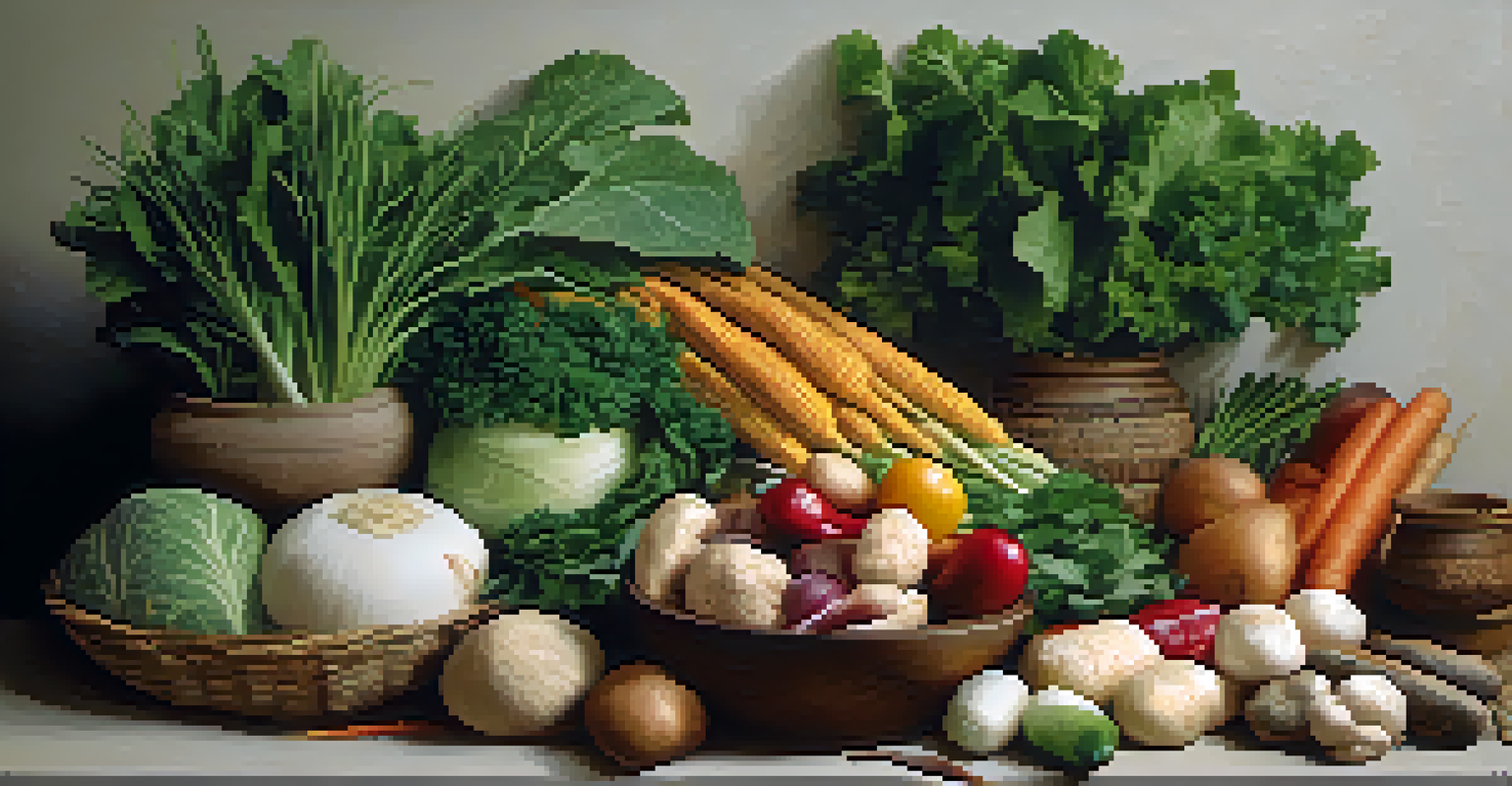Cultural Rituals: Food and Spirituality in Native American Tribes

Understanding the Spiritual Significance of Food
In Native American culture, food transcends mere sustenance; it embodies spiritual significance. Many tribes view food as a gift from the earth, deserving of respect and gratitude. As such, meals are often accompanied by prayers and rituals that honor the spirit of the food, reinforcing a deep connection with nature.
Food is a central component of culture, and it connects us to our ancestors and our land.
This relationship to food is not just about nourishment but also about community and identity. Meals are often communal events, where stories are shared and traditions are passed down. This practice strengthens bonds between family members and the larger community, as they come together to celebrate their heritage.
Moreover, the rituals surrounding food preparation and consumption often reflect the tribe's values and beliefs. Whether it’s the careful selection of ingredients or the specific ways food is cooked, these practices serve as a reminder of the tribe's connection to their ancestors and the land.
Ceremonial Feasts: A Celebration of Life and Community
Ceremonial feasts are pivotal in Native American tribes, serving as occasions for celebration, mourning, and spiritual renewal. These gatherings often mark significant events, such as harvests or rites of passage, where food plays a central role in the festivities. The act of sharing food during these ceremonies symbolizes unity and the importance of community.

During these feasts, traditional dishes are prepared, often featuring ingredients that hold cultural significance. For example, corn, beans, and squash, known as the 'Three Sisters,' are staples that represent harmony and balance in nature. The preparation of these dishes can involve intricate rituals that honor their origins, showcasing the deep respect for the earth's bounty.
Food as Spiritual Connection
In Native American cultures, food serves as a vital medium for connecting with ancestors and the spiritual world.
Additionally, the communal aspect of these feasts reinforces social ties and encourages storytelling. Elders often share tales that educate the younger generations about their history, values, and the lessons embedded in their cultural practices. This not only preserves traditions but also fosters a sense of belonging among tribe members.
The Role of Rituals in Food Preparation
Rituals play a critical role in how food is prepared within Native American cultures. Before cooking, many tribes engage in prayers or offerings to the spirits, seeking blessings for the meal. This practice highlights the belief that food preparation is a sacred act, where each step is infused with intention and reverence.
The act of sharing food is a way to honor the teachings of our ancestors and to foster a sense of belonging within our community.
The methods of preparation often reflect the tribe's connection to their environment. For instance, hunting and gathering practices are accompanied by rituals that honor the animals and plants involved. This not only ensures that the tribe remains connected to their natural resources but also teaches respect for the ecosystem as a whole.
Moreover, these rituals can vary significantly between tribes, showcasing the diversity of Native American cultures. Each tribe has its unique customs that reflect their history, geography, and spiritual beliefs, creating a rich tapestry of practices surrounding food preparation.
Food as a Medium for Spiritual Connection
Food serves as a powerful medium for spiritual connection among Native American tribes. Each meal can be seen as an opportunity to connect with ancestors and the spiritual world. Many tribes believe that inviting the spirits to partake in their meals helps to maintain harmony and balance in their lives.
This connection is often reinforced through specific foods that have deep cultural or spiritual meanings. For example, certain herbs are used not just for flavor but also for their medicinal properties, symbolizing the holistic approach to health that is prevalent in many tribes. The act of consuming these foods is a way to honor the teachings of their ancestors.
Community and Tradition in Meals
Meals are communal events that strengthen bonds and pass down cultural traditions within Native American tribes.
Furthermore, the sharing of food during rituals fosters a sense of unity with the community and the universe. By coming together to break bread, tribe members reinforce their ties to one another, their ancestors, and the natural world, creating a sense of belonging and purpose.
Seasonal Rituals and the Cycles of Nature
Seasonal rituals are a prominent feature in Native American cultures, marking the changing cycles of nature and the harvest. These rituals often involve specific foods that are harvested at particular times of the year, symbolizing the tribe's reliance on the land and its resources. Celebrating these cycles helps to reinforce a sense of gratitude and respect for nature.
For instance, the arrival of spring may be celebrated with a feast featuring newly harvested greens, while the autumn harvest may bring in root vegetables and grains. Each season's food not only nourishes the body but also serves as a reminder of the interconnectedness of life and the importance of living in harmony with nature.
Additionally, these seasonal rituals often include dances, songs, and stories that celebrate the bounty of the earth. They serve as educational experiences that instill a sense of responsibility towards the environment in younger generations, ensuring that the knowledge of their ancestors is passed down and respected.
The Impact of Modernization on Traditional Practices
Modernization has significantly impacted the traditional food practices of Native American tribes. With the influx of processed foods and fast food culture, many tribes face challenges in maintaining their dietary customs. This shift can dilute the spiritual significance of food and disrupt the communal practices that have been central to their cultures for generations.
However, many tribes are actively working to reclaim their traditional foodways. Initiatives aimed at reviving indigenous agricultural practices and promoting the consumption of traditional foods are gaining momentum. These efforts not only help to restore cultural identity but also promote health and well-being within the communities.
Impact of Modernization on Traditions
Modernization poses challenges to traditional food practices, but many tribes are reclaiming their culinary heritage to promote health and cultural identity.
Moreover, the resurgence of traditional food practices emphasizes the importance of food sovereignty, which is the right of communities to control their own food systems. By prioritizing local, sustainable sources, tribes are not only preserving their cultural heritage but also fostering resilience against the impacts of globalization.
Conclusion: The Enduring Legacy of Food and Spirituality
The relationship between food and spirituality in Native American tribes is a profound testament to their cultural resilience. Food is not just a means of survival but a connection to their ancestors, the earth, and the community. Through rituals and shared meals, tribes celebrate their heritage and reinforce their values.
As modernization continues to influence these practices, the efforts to reclaim traditional foodways and cultural rituals are vital. They serve as a reminder of the importance of maintaining connections to one's roots and the natural world, fostering a sense of identity in an ever-changing landscape.

Ultimately, the enduring legacy of food and spirituality in Native American cultures illustrates the deep bonds that unite people with nature and each other. It is a powerful reminder that food can nourish not only the body but also the spirit, shaping the very essence of cultural identity.